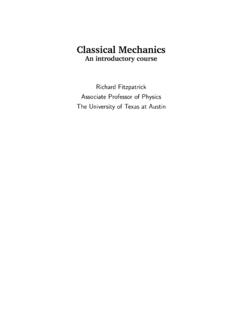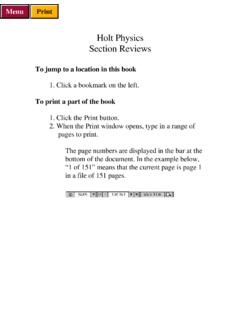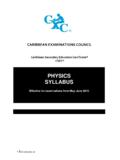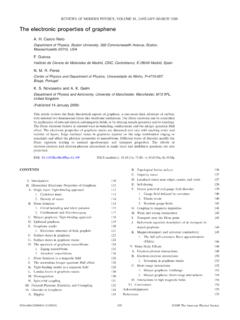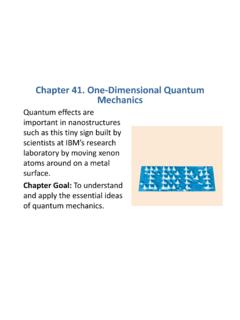Transcription of Scientific epistemology: How scientists know what they know
1 Scientific epistemology : How scientists know what they know Carl J. Wenning, physics Education Specialist, physics Department, Illinois State University, Normal, IL. 61790-4560 Scientific inquiry is only one epistemological approach to knowledge. The author addresses several ways of knowing in science and contrasts them with other approaches to knowledge in order to better understand how scientists in general, and physicists in particular, come to know things. Attention in this article is focused on the processes of induction and deduction, observation and experimentation, and the development and testing of hypotheses and theories.
2 This chapter takes a physicist's practical approach to epistemology and avoids such statements as the transcendental deduction of the synthetic a priori more typical of philosophers. Implications for teaching high school physics are included. This article is one of several chapters produced for the book Teaching High School physics , and is intended for use in high school physics teacher education programs at the university level. epistemology in a brief chapter is a task of great delicacy because, in order avoid being entirely superficial, one must strongly epistemology concerns itself with ways of knowing limit the subject matter that one touches upon and the and how we know.
3 The word is derived from the Greek depth of which it is addressed. Authors such as Galileo, words epist me and logos the former term meaning Newton, Bacon, Locke, Hume, Kant, Mach, Hertz, knowledge and that latter term meaning study of . Poincar , Born, Einstein, Plank, Popper, Kuhn, and many, Hence, the word parsed into English implies the nature, many others have written tomes in this area of the source, and limitations of knowledge. As such, the study of philosophy of science. The present author has been epistemology historically has dealt with the following selective in choosing from among the many topics fundamental questions: addressed by these authors on the basis of that which will be most suitable for physics teaching majors, and What is knowledge, and what do we mean when we addressing these topics at a level consistent with their need say that we know something?
4 For understanding. Science teachers need to understand the What is the source of knowledge, and how do we types of arguments that scientists use in actual practice to know if it is reliable? sustain the subject matter that they claim as knowledge. What is the scope of knowledge, and what are its Science is more than a conglomeration of facts, and limitations? teaching consists of more than just relating the facts of science. Science is a way of knowing that requires a strong Providing answers to these questions has been the philosophical underpinning (whether consciously sought of focus of attention for a very long time.)
5 More than 2,000 unconsciously learned). One cannot assume that students years ago Socrates (c. 469 BC 399 BC), Plato (428/427 who understand the facts, principles, laws, and theories of BC 348/347 BC), and Aristotle (384-322 BC) wrestled science necessarily know its processes and their with various answers to these questions, but were never philosophical underpinning. They cannot be assumed to able to resolve them. At best they were able only to learn the philosophy of science by osmosis; it should be provide partial answers that were attacked time and directly taught. It is hoped that the prospective physics again by later philosophers the likes of Descartes (1596 teacher will, as a result of reading this chapter, more fully 1650), Hume (1711 1776), and Kant (1724 1804).
6 Not understand the nature and dilemmas of science. It is even these giants of philosophy were able to provide expected that this understanding will impact his or her lasting answers to these questions, and, indeed, the teaching for the better. The author also hopes that this discussion continues down to the present day. Even a more chapter sparks the interest in readers to the extent that they recently proposed solution to the definition of knowledge will find their way to reading more broadly in this defining knowledge as justified true belief (see Chisholm, critically important area. 1982) has failed in the light of arguments proposed earlier by Gettier (1962).
7 Knowledge versus Faith Philosophy and Science When historians say that they know something, is their type of knowledge the same as that of scientists when Philosophy often interacts with science especially they say that they know something? Do sociologists speak physics at many points and in countless ways. scientists with the same surety as scientists ? When a theologian are often confronted with the question, How do you makes a proclamation, is the degree of certitude the same know? Providing an answer to that question frequently is as that of a scientist ? Frankly, the answer to all these not easy and often moves such a discussion into the field questions is in the negative.
8 Science, sociology, history, of Scientific epistemology . Addressing this subject matter J. Phys. Tchr. Educ. Online, 5(2), Autumn 2009 Page 3 2009 Illinois State University physics Dept. and religion each have their own ways of knowing and We believe that when someone jumps out of an open different types of certitude. window, the person falls to the ground. One fundamental question with which all scientists We are justified in believing that when someone ultimately must reckon is how they actually know jumps out of an open window, the person falls to the anything. Consider for instance the following statements: ground.
9 The Earth is a spheroid. The first statement clearly has been the case since The Earth spins daily on its axis. windows were invented or one can legitimately make that The Earth orbits the Sun annually. argument. However, might one not be equally justified in saying that someone who jumps out of an open window Most readers will agree with these assertions, but how will fall to the ground until next Tuesday at noon after many of them actually know that the Earth is a spheroid, which time people will then fall into the sky? The spins daily upon its axis, and orbits the Sun annually? Do inferential process based on experience could support both they know these statements to be correct, or do they merely claims unless one makes a presumption about the nature of have faith that they are correct?
10 The fact of the matter is the world: the laws of nature are forever constant and that the vast majority of even physics majors will not know apply the same way to all matter across both time and the basis for these statements that took scientists many space. years to develop. The facts underlying these This view is known as the Uniformity of Nature understandings are by no means clear. Indeed, the Principle, and is one upon which all science and scientists philosopher- scientist Aristotle argued so eloquently against rely. It is based on a long human record of experiences the motion of the Earth that his reasoning held sway for with nature, and is supported even in our observations of nearly two millennia.

